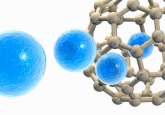New biomarkers discovered for early detection of cystic fibrosis

Researchers from McMaster University (Ontario, Canada) have identified several new biomarkers from a single drop of blood that allow earlier and more definitive detection of cystic fibrosis (CF) in infants. This discovery is significant as it could help improve the accuracy of newborn screening to avoid the need for additional testing and stress for parents as a result of false-positives.
“The earlier CF is detected, the earlier it can be managed and treated, which means better health outcomes for affected infants, including their future growth and development,” commented Philip Britz-McKibbin, McMaster University, who conducted the research with graduate student Alicia DiBattista.
Universal CF screening programs require a drop of blood to be drawn from the heel of all newborns that is then tested for a pancreatic enzyme and various disease-causing genetic mutations associated with CF. However, further testing is often required to confirm or rule out the disease, with most babies who screen-positive being found not to have the disease but instead be healthy carriers of the CF gene or have false-positive results.
In the study, published in the Journal of Proteome Research, researchers analyzed and compared blood samples from infants confirmed to have CF with healthy and screen-positive infants. Several new compounds and simple amino acids were found to directly relate to infants with CF who would otherwise show no symptoms and were normal birth weights.
“These biomarkers provide new insights into the disease process early in life before symptoms are fully apparent,” explained Britz-McKibbin. “Moreover, these compounds can be analyzed by mass spectrometry at incremental costs since it is already used for testing many other genetic diseases at newborn screening facilities around the world.”
“Ontario started screening for CF in April 2007, and since that time over 400 children have already benefited from early recognition and early treatment. But for every one of these children, about 10 have had a false-positive result. We want to get this number down and are very hopeful that the new biomarkers discovered by this research project will help us do exactly that,” commented Pranesh Chakraborty, Children’s Hospital of Eastern Ontario (Canada).
Better treatments to improve lung function, improved nutrition and lung transplants have contributed to the increase in life expectancy rates of CF patients in Canada, with the median age of survival now over 50 years. It is hoped that the introduction of new universal newborn screening programs for CF testing for these biomarkers will further improve the quality of life for those affected with the disease.
“We know that early detection can have significant benefits for people living with cystic fibrosis,” commented John Wallenburg, Cystic Fibrosis Canada (Ontario, Canada). “The current screening methodologies capture a broad swathe of families that then need further testing to narrow down those that are true positives. The anxiety and distress that such further testing can needlessly cause families was a major concern that slowed the adoption of newborn screening in some jurisdictions. Dr Britz-McKibbin’s data provide insights for more specific newborn screening, as well as early manifestations of the disease.”
Sources: DiBattista A, McIntosh N, Lamoureux M et al. Metabolic signatures of cystic fibrosis identified in dried blood spots for newborn screening without carrier identification. J. Proteome Res. doi:10.1021/acs.jproteome.8b00351 (2018) (Epub ahead of print); https://brighterworld.mcmaster.ca/articles/identifying-cystic-fibrosis-earlier-and-more-reliably/





